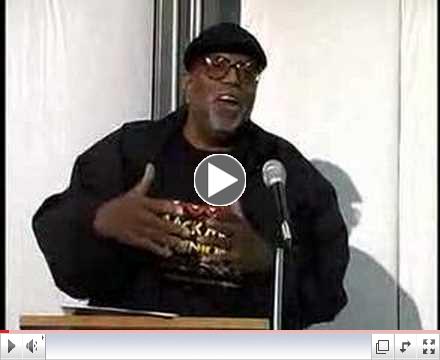 | General Baker (1942-2014), Presente! Speaking here at Benton Harbor, Michigan
|
|
GritTV on 'Jackson Rising'
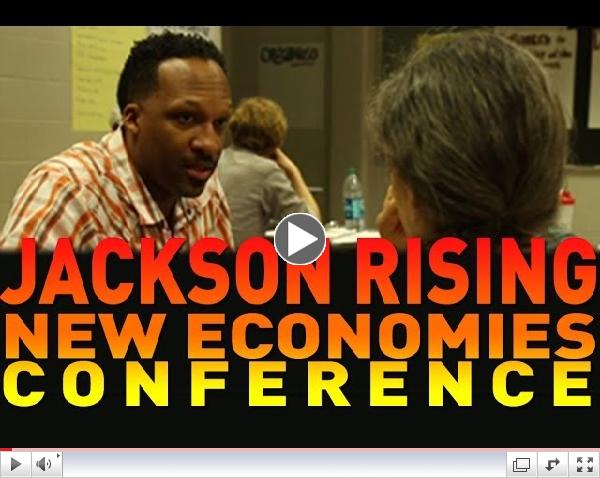 | |
Creating the Mondragon of the South (includes short interview with CCDSer Carl Davidson)
|
|
 | |
Journal of the Black Left Unity Network
|
|

New CCDS Book Reporting on Vietnam
|
 The new annual edition of our journal of discussion and analysis is now out. More than 130 pages, it includes 20 articles on organizing, racism and the right. Cost is $10 plus shipping. Or get one by becoming a sustainer. Click the title to buy it directly. The new annual edition of our journal of discussion and analysis is now out. More than 130 pages, it includes 20 articles on organizing, racism and the right. Cost is $10 plus shipping. Or get one by becoming a sustainer. Click the title to buy it directly.
|
|
Radical Jesus:
A Graphic History of Faith 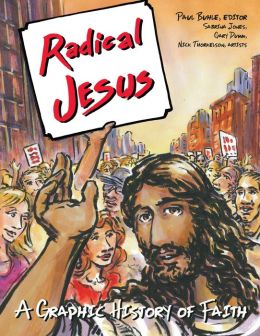 By Paul BuhleHerald Press By Paul BuhleHerald Press
|

Want to Know what CCDS has
been doing...Check it Out!
|
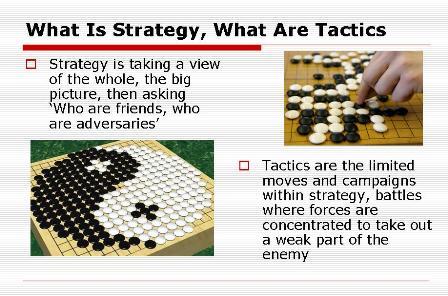 Keep On Keepin' On Keep On Keepin' OnHating the 'Middle Class,' Why Socialists Run in Elections, Strategy and Tactics Slide Slow, Class and Privilege, the Green New Deal ...and other Short Posts on Tumblr by Carl Davidson
|

Edited by Carl Davidson Revolutionary Youth the the New Working Class: The Praxis Papers, the Port Authority Statement, the RYM Documents and other Lost Writings of SDS
Changemaker, 273pp, $22.50
For the full contents, click the link and view 'Preview' under the cover graphic.
|
|
By Randy Shannon, CCDS

"Everyone has the right to work, to free of employment, to just and favorable conditions of work and to protection against unemployment."
- United Nations Universal Declaration of Human Rights, December 10, 1948
I. Introduction
The "Great Recession" that began in 2007 has caused the greatest percent of job losses since the Great Depression of 1929. This crisis is the end of an era of unrestrained 'neo-liberal' capitalism that became public policy during the Reagan administration. The crisis marks a new level of instability with the growth of a global financial elite that targeted US workers and our trade unions after World War II.
|
|
Order Our
Full Employment Booklets
 |
...In a new and updated 2nd Edition
Capitalism may well collapse under its own excesses, but what would one propose to replace it? Margaret Thatcher's mantra was TINA...There Is No Alternative. David Schweickart's vision of "Economic Democracy" proposes a serious alternative. Even more fundamentally, it opens the door to thinking about alternatives. His may or may not turn out to be the definitive "successor system," but he is a leader in breaking out of the box. |
 by Paul KrehbielAutumn Leaf Press, $25.64
by Paul KrehbielAutumn Leaf Press, $25.64 | | Shades of Justice Video: Bringing Down a President, Ending a War |
|
 By Giuseppe Fiori
Verso, 30 pages
|

Essays on Mondragon, Marx, Gramsci
and the Green and Solidarity Economies |
Solidarity Economy:What It's All About

Edited by Jenna Allard, Carl Davidson and Julie Matthaei
Buy it here...
|

- Foreword by Susan Brownmiller
- Preface by Ken Wachsberger
$37.50 + $6 shipping
|
|
Discussion Documents for a Militant Movement

By Don Hamerquist
|
|
|
|
An Invitation to CCDSers and Friends...
 Youth, Banksters Youth, Banksters
and the Prospects
at the Polls in 2014
We're the Committees of Correspondence for Democracy and Socialism...Do you have friends who should see this? Pass it on...Do you have a blog of your own? Others you love to read every day? Well, this is a place where you can share access to them with the rest of your comrades. Just pick your greatest hits for the week and send them to us at carld717@gmail.com! Most of all, it's urgent that you oppose war on Iran, defend voter rights, plan for 2014 races now, oppose austerity, support the 'Moral Mondays' in North Carolina, the Congressional Progressive Caucus' 'Back to Work Budget'! We're doing more than ever, and have big plans. So pay your dues, make a donation and become a sustainer. Do it Now! Check the link at the bottom... |
Students Now Indentured to the Banksters

By The Daily Take Team The Thom Hartmann Program
May 22, 2014 - Never in the history of the developed world has an entire generation had to go into debt just to get an education and a job. Until now.
Back in January, 31-year-old Tony Muzzatti, who at the time owed around $60,000 in student loan debt to Sallie Mae and always made on-time payments, was told that he had to immediately make a payment of $10,000, or face asset seizures.
That's because his grandmother, who also happened to be his cosigner on the student loans, had just died.
Christopher Kibler was also told by Sallie Mae that he had to immediately pay back nearly $22,000 in student loan debts after his father, the cosigner on his loans, had passed away.
Muzzatti and Kibler are just two of the many victims of what the Consumer Financial Protection Bureau refers to as "auto-defaults," or when banks immediately say that private student loan debts are in default after the death or bankruptcy of a cosigner.
The "auto-default" practice is just one of the many ways that big banks and Wall Street executives are making billions of dollars off of an entire generation of struggling, debt-ridden Americans.
Right now, there's over $1.18 trillion in outstanding student debt in America.
More than 40 million Americans hold student loan debt, which is greater than the entire population of Canada, Poland, North Korea, Australia and more than 200 other countries.
And of those 40 million borrowers, around 7 million have defaulted on their debt.
The average debt for a 25-year-old American student has risen a staggering 91 percent over the past decade, and the average college debt per person is over $23,000.
An entire generation of Americans is completely screwed, and is unable to start a family, buy a house, and build the equity needed to retire down the road....(Click title for more)
|
|
Moral Mondays Resume, Seek to Block NC Voter Suppression Law, Remove Curbs on Speech

By Sue Sturgis Facing South
May 20, 2014 - The Moral Monday protests that led to the arrests of more than 900 people last year for engaging in civil disobedience have returned to the North Carolina legislature, with several thousand people gathering outside this week as lawmakers convened for the first full week of the 2014 short session.
Following speeches by protest leader and N.C. NAACP President Rev. Dr. William Barber and others decrying the extremist policies of the Republican-controlled legislature, the protesters broke pieces of bread from loaves passed through the crowd as part of a love feast, an ancient Christian ritual carried out to symbolize the protesters' moral conviction that there is more than enough to meet everyone's need. Among the policy changes the protesters are calling for are Medicaid expansion, restoration of the state earned income tax credit, a reversal of cuts to unemployment benefits, and restoration of curtailed voting rights.
The protesters then placed tape over their mouths and filed silently through the General Assembly building to dramatize their opposition to rule changes a legislative committee approved last week without public debate that prohibit visiting groups from making enough noise to interfere with normal conversation. Before he placed the piece of tape over his own mouth, Barber called the policy change "political tyranny" and said it was "like trying to tape up democracy."
"We do it not to be complicit with the law," he said of the tape, "but to be defiant of the law."
However, Barber promised it would be the last time the protesters would remain silent. Though no one engaged in civil disobedience during this week's protest and no arrests were made, Barber said there was no such commitment for future gatherings. Since next Monday is the Memorial Day holiday, the protesters will convene on Tuesday morning instead for a lobby day before resuming weekly Monday gatherings. The legislature is expected to be in session for at least six weeks.
The same day Moral Mondays returned to Raleigh, the N.C. NAACP and other plaintiffs in an ongoing lawsuit against a restrictive voting law passed last year (House Bill 589, the Voter Information Verification Act) filed a motion for a preliminary injunction in federal court to block the law from being enforced for this year's election, claiming that it would cause "irreparable harm." Analyses have shown the new law would disproportionately affect women, people of color, the elderly, and the poor. ...(Click title for more)
|
|
By Kim Bellware & Jillian Berman
Huffington Post
May 21, 2014 - OAK BROOK, Ill. -- Police arrested a rabbi and others who took part in a protest on the campus of McDonald's headquarters on Wednesday afternoon.
After protesters passed through a security kiosk onto McDonald's property, police issued an order to disperse and began arresting protesters lined up behind a barrier erected in front of a headquarters building. Despite the arrests, the atmosphere seemed collegial. "We're all on the same team," a police officer told the unnamed rabbi.
Police arrested 138 people, including many workers, for trespassing, according to a spokeswoman from the Oak Brook Police Department.
Protesters, who are demanding $15 an hour and the right to unionize, are also slated to continue their actions during McDonald's shareholder meeting to be held on Thursday.
One protest organizer, Rev. Ronald Wanless who came all the way from Pittsburgh, Pennsylvania, said he'd offer the cops a beer if he could.
Emmanuel Gonzalez, who has been working at McDonald's for seven months, said he showed up to the protest Wednesday prepared to be arrested (he hasn't been). Arrest is "the price we have to pay to fight for $15 and hour," said the 18-year-old, who is just weeks away from his high school graduation.
McDonald's spokeswoman Lisa McComb wrote in an email to HuffPost that "the company remains focused on welcoming our shareholders to McDonald's annual meeting."
"We respect everyone's rights to peacefully protest," she wrote. McComb also called the protests "a staged event," and said that only a small number of the participants were McDonald's workers, a claim activists dispute.
McDonald's closed the building originally scheduled to be the site of the protests, pushing activists to move the demonstration to a nearby location on the company's sprawling Illinois headquarters. McComb acknowledged in an email to The Huffington Post that the company closed the building on advice from the police. McComb wrote that the McDonald's campus includes several buildings, most of which remain open.
"We've adjusted work schedules for our employees and access to our facilities to assist the Oak Brook Police Department to address the protests and the related traffic congestion," she wrote in the emailed statement. ...(Click title for more)
|

By Jane Slaughter
In These Times
The decision to use 'salts' can color the flavor of a union campaign. (Karyn Christner/Flickr/Creative Commons)
Bosses hate a salt-a pro-union worker who's taken a job with the intent to organize.
A few unions are recruiting salts these days, usually young people who apply for low-wage jobs in retail, hospitality, or logistics. But unions are reluctant to talk about salting, not wanting to alert management to look out for suspicious characters. In this article every worker will use a pseudonym and their situations will be disguised.
Former salt Kendra Baker says salting offers something the labor movement badly needs: a "space for young people to develop skills as workplace organizers." The 2011 uprising in Wisconsin and the Occupy movement created "a lot of curiosity and enthusiasm about the labor movement," she said.
Now coordinating a salting program, she stresses that salting ensures a union drive will have "a workplace-organizing component, to maintain a level of militancy on the shop floor and make sure the campaign is putting the workers first. Workers should be taking a lead on the messaging and on the goals and planning the actions."
Salts these days tend to be young people who were activists in college-the same sort of folks many unions recruit to be staff organizers.
But salts we spoke with saw advantages to being on the inside.
Ronnie Stevens decided to salt after being a staffer. "I had come up against frustrations about lack of access to workers in the shop," he said, "and the general frustrations that any organizer has trying to get in touch with people for that first conversation-as well as the trust aspect....(Click title for more)
|
Saladin Muhhammed Speaking for Workers
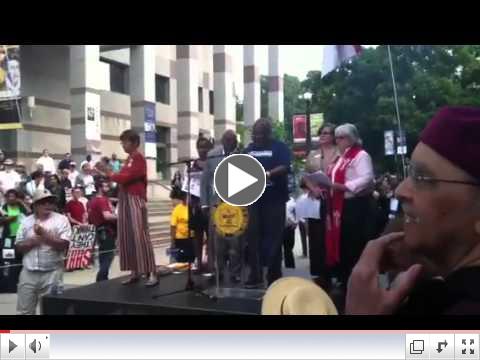 | |
Saladin at Moral Monday, May 19, 2014
|
|
Angela Davis featured at National
Forum on Police Crimes in Chicago

Police repression and ideological mystification are the glues that maintain structural violence. By Harry Targ
The Rag Blog
May 19, 2014 - CHICAGO - It was inspiring and informative attending the rally with Angela Davis and the celebration of the lifelong political work of Charlene Mitchell, the founder of the National Alliance Against Racist and Political Repression (NAARPR). The rally and award ceremony honoring Davis and Mitchell capped a two-day National Forum on Police Crimes at the University of Chicago.
The National Forum held workshops highlighting police crimes against undocumented and other immigrant workers, the labor movement and all workers, the LGBTQ community, women, peace, and solidarity activists, and people of color.
Central themes reflected in the workshops and the rally included the current condition of police misconduct in the United States, an analysis of the fundamental role of the police and incarceration in the United States, the interconnectedness of forms of repression and the struggles against them, and the twin roles of repression and ideology as the glues holding together a global political economy in crisis. Last, the celebration of the 41 years of the NAARPR illustrated the possibilities of struggle and victory.
The call for the National Forum highlighted the contemporary crises of civil rights and civil liberties including:
- a "national epidemic" of police and vigilante killings of young African-American men, such as Trayvon Martin and Oscar Grant;
- the mass incarceration of people of color such that, as Michelle Alexander has reported, more African-Americans are in jail or under the supervision of the criminal justice system today than were in slavery in 1850;
- the targeting and deportation of millions of immigrants;
- the institutionalization of laws increasing surveillance;
- the passage of so-called Stand Your Ground laws, justifying gun violence against people perceived as a threat;
- and the continued persecution of political prisoners from the recently convicted Occupy Movement activist Cecily McMillan, to the 30-year listing of exiled Assata Shakur, living in Cuba, as one of the FBI's most wanted terrorists, despite the fact that her original conviction for murder was based on faulty evidence.
Several speakers during the rally made it clear that the primary purpose police forces play in the United States is to protect the stability of the existing economic and political system. In short, the police in virtually every community serve the interests of what Occupiers call the one percent in opposition to the 99 percent....(Click title for more)
|
|
An Interview with Bernd Riexinger,
co-chair DIE LINKE - May 2014
On May 28, the Rosa Luxemburg Stiftung-New York Office and Jacobin Magazine are hosting a public discussion on the future of the European Left between Bernd Riexinger, co-chair of Germany's Left Party (DIE LINKE), and SYRIZA strategist Elena Papadopoulou. How are DIE LINKE and SYRIZA building on what came before them, and how are they breaking with old traditions? In which direction are the two parties, and is the European left altogether, heading?
In this interview, Bernd Riexinger talks about strategic challenges facing DIE LINKE. Citing Rosa Luxemburg's idea of "revolutionary Realpolitik," he examines the current situation and lays out strategic ideas for the future. The interviewer, Luigi Wolf, starts by going back to the legacy of the "united front strategy," which was established by the Communist Party of Germany (KPD) in the 1920s,1 and then shifts to the challenges DIE LINKE currently faces.
Luigi Wolf: The united front is actually the core concept behind Rosa Luxemburg's notion of "revolutionary Realpolitik," but it has been largely forgotten. I think it is important to revive the idea of the united front, but without ignoring the differences between the 1920s and today's society. The reason for this is that the united front was a revolutionary communist party's answer to the question of how to become a mass party. Although DIE LINKE is a left-wing reformist party, we still have to ask ourselves questions such as how are we to reach the majority of the population. How are we to relate to social democracy? How can we move away from a defensive position? How can we ensure that strategic considerations - and not just moral indignation - become the driving force behind our actions?
Bernd Riexinger: It is essential to develop a clear understanding of history because there are many differences between the past and today's situation. The 1920s were characterized by a relatively clear division between the workers' parties and those of the bourgeoisie. This meant that the bourgeois parties gained very little access to the workers' parties. This is very different today, and many union members now belong to the CDU or the SPD.
Back then, the German labor movement was divided into supporters of the KPD and the SPD. A major difference from today, of course, is that both parties advocated socialism: for one party this was a revolutionary concept; the other aimed at a gradual progression towards socialism through social reform.
It would be wrong to compare today's situation with the 1920s, even when discussing how we conceptualize our own party. But it is still worth examining the concept of the united front. I personally learned a lot from reading up on the KPO,2 which developed the idea of the united front. It was also one of the most important organizations within the KPD that supported the united front and successfully applied the concept between 1919 and 1923. This helped avert the Kapp Putsch3 and led to the only successful general strike during the 1920s in which this alliance actually worked in principle. Above all, however, the united front would have provided a means of fighting against fascism. Instead of doing so, the KPD and its social fascism theory,4 which had a lot to do with the foreign policy interests of the Soviet Union under Stalin, completely isolated itself and even set up its own trade unions. These unions5 organized far fewer strikes than those of the General German Trade Union Confederation. But this was mainly due to the fact that their membership largely consisted of unemployed people.
Question: Do you think an alternative strategy could have prevented fascism?
Riexinger: It is important to be clear about the fact that the KPD and the SPD were not directly responsible for fascism. However, the strategies that they implemented against fascism obviously failed. A united front strategy, aimed at establishing unity among the working class, would have had a good chance of preventing fascism. The struggle over issues concerning people's everyday lives is clearly important, and these issues provide a means of establishing unity. However, in my opinion, transitional demands also form an essential aspect of the united front. During its better periods, the KPD not only promoted socialism; it also detailed its demands, and this made specific elements of a socialist society tangible to the population. The best-known transitional demand is for the control of the means of production; in other words, that the workers should be in control of production. This is different from demanding that the bourgeois state nationalizes production; it is about placing direct control of production in the hands of the workers.
Question: How do these old KPD strategies relate to the current work of the DIE LINKE?
Riexinger: First, our relationship with the SPD is not the same as the relationship between the KPD and the SPD back then. Just as DIE LINKE is not a revolutionary party, today's SPD is very different from how it was then. But it is possible to compare certain strategic issues. One example is the question of our relation to SPD voters. The KPD's social fascism theory led it to argue that it was possible to differentiate between the members and supporters of the SPD on one hand, and the SPD leadership on the other. The theorists behind the united front followed a different approach. They still wanted to win over the Social Democratic vote for the KPD, but they realized that referring to the party's leadership as social fascists would only encourage SPD supporters to back its leadership more strongly than ever instead of rejecting it. This also explains why they insisted on calling on the SPD as a whole to participate in joint action....(Click title for more)
|
By Eddie Cockrell
Variety
May 22, 2014 - Rolf de Heer's compassionate, clear-eyed drama about the contemporary Aboriginal condition is a showcase for veteran actor, co-scenarist and friend David Gulpilil.
Eddie Cockrell
The tangled tale of Aboriginal relations in Australia is rendered richly personal in director Rolf de Heer's 14th dramatic feature, "Charlie's Country." Anchored by the charismatic, tragicomic performance of indigenous icon David Gulpilil, a veteran of "Walkabout," "The Last Wave," "Rabbit-Proof Fence," plus de Heer's "The Tracker" and "Ten Canoes," this atmospheric and cautionary tale of a "Blackfella" caught between two cultures has all the makings of a solid arthouse performer.
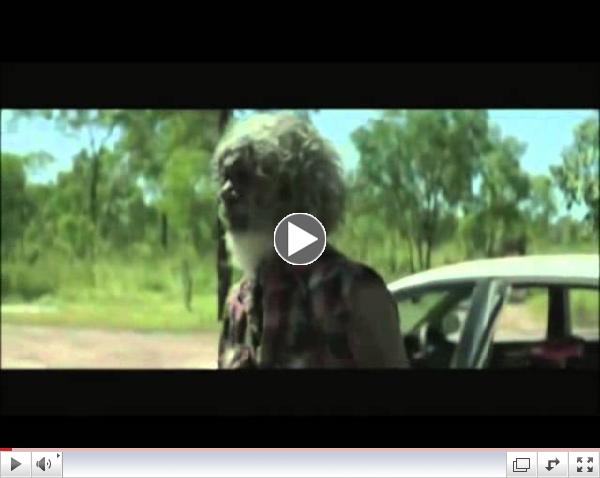 | | Cannes 2014 - Charlie's country Trailer |
The irony of the title is soon made clear. "You white bastard!" Charlie (Gulpilil) calls almost affectionately to the policeman Luke (Luke Ford) in the small Northern Territory Aboriginal community he calls home, only to get the inevitable response of "you black bastard." But as Charlie goes about his daily tasks, it soon becomes clear he is chafing against the encroaching white laws that increasingly separate him from his traditions. His friends are faring no better, as he runs afoul of the law with buddy Black Pete (co-producer Peter Djigirr) and listens to Old Lulu (Peter Minygululu) talk about preserving authentic dance culture.
When Luke confiscates a spear Charlie spent some time fashioning, it drives him further into the bush in an attempt to reconnect with the traditional Aboriginal way of living (he is undone by the most mundane of events, a chilly and relentless rain). After falling in with a group of homeless Aboriginals in Darwin who drink and smoke weed constantly ("long grassers," as they're known), Charlie is arrested and incarcerated. In a stunning real-time sequence, his thick mane of hair and full beard are shorn, thus completing his isolation and loss of freedom.
Charlie is the vessel through which de Heer navigates these turbulent waters, and the script was developed during sessions when the actor would throw out ideas and the director would structure the results. It is to both men's credit that amid the suffering, there's a ray of hope for Charlie in the end.
Since his 1971 debut at 16 in Nicolas Roeg's "Walkabout," Gulpilil has developed into an actor capable of mischievousness and gravitas, often within the same shot. His well-publicized bouts with alcoholism and the law haven't significantly tarnished his reputation, and represent the embodiment of the societal tensions addressed in the film. So, too, the Dutch-born de Heer has built a solid reputation as a filmmaker not so much fascinated as moved to modest yet probing action by social friction and injustice (his earliest major success, 1993's "Bad Boy Bubby," was the first of four of his films to be selected by Cannes).
The tech package is seamless. Ian Jones' widescreen photography immerses the viewer in the Australian outback, while Graham Tardif's plaintive score emphasizes both the dignity and the anguish of Charlie's all-too-common plight.
Running time: 108 MIN.
|
|
By Frank Islam and Ed Crego
Huffington Post
May 9, 2014- Thomas Piketty's new book, Capital in the 21st Century, which examines the nature and forecasts the consequences of wealth and income inequality has shot to the top of the best-seller's list since its release here in the United States on April 15.
Based upon his analysis of two decades of data from 20 countries, Piketty, a French economist paints a rather gloomy picture of the U.S. In an article for The Financial Times, he writes that prior to World War I wealth inequalities were far greater in European countries than in the U.S. but throughout the rest of the 20th century till today that "situation was reversed."
Piketty observes that inequalities reach "extreme levels" when "returns accrue to owners of capital faster than the economy grows, handing capitalists an ever larger share of the spoils..." He reports that, based upon Forbes global billionaire rankings, wealth of the very richest grew more than three times as fast as the world economy between 1987 and 2013.
His solution to this problem would be to implement a global progressive tax on individual net worth. We see that as a novel idea and recommendation but not a very practical one. Indeed, Piketty himself states, "U.S. inequality may now be so sharp, and the political process so tightly captured by top earners, that necessary reforms will not happen..."
We agree with Piketty's surmise about the potential for reforming the U.S. tax system -- at least in the near to mid-term. With the rare exception, however, we don't see much of an appetite from the wealthiest capitalists here in the U.S. to engage in a new form of capitalism that would "redistribute" or change the manner in which income or wealth is presently being shared.
That's why we have come to the conclusion that for the American economy and democracy to renew itself fully in the future, our nation needs a new breed of capitalists in the 21st century. Those capitalists must be workers. Let's look at why and where things stand returning to Piketty's perspective for a moment.
In an article in the New York Times, Steve Erlanger states, "... "Mr. Piketty says that inequality by itself is acceptable to the extent it spurs individual initiative and the generation of wealth. But extreme inequality, he contends will have a deep and deleterious effect on democracy."
We concur with Piketty's contention and believe that because of current conditions our American democracy and the American economy are on a slippery slope today. Wealth and income inequality and the perception of a lack of opportunity in combination are making them more fragile crucibles. ...(Click title for more)
|
Greet Freedom Summer's 50th With a Red Resolution...
Become a CCDS member today!
 The time is long past for 'Lone Rangers'. Being a socialist by your self is no fun and doesn't help much. Join CCDS today--$36 regular, $48 household and $18 youth. The time is long past for 'Lone Rangers'. Being a socialist by your self is no fun and doesn't help much. Join CCDS today--$36 regular, $48 household and $18 youth.
Better yet, beome a sustainer at $20 per month, and we'll send you a copy of Jack O'Dell's new book, 'Climbing Jacobs Ladder,' drawing on the lessons of the movement in the South in the 1950s and 1960s.
Solidarity, Carl Davidson, CCDS
|
|
|